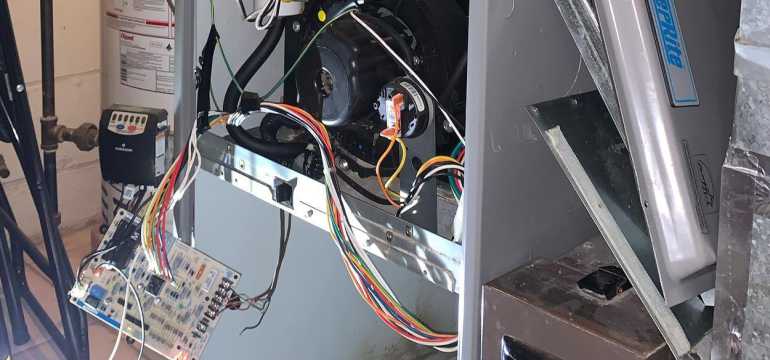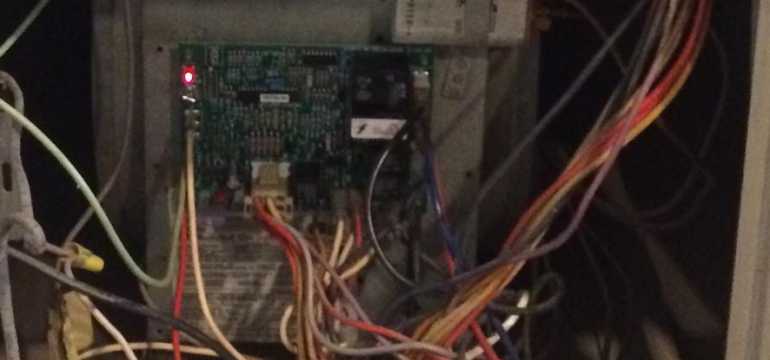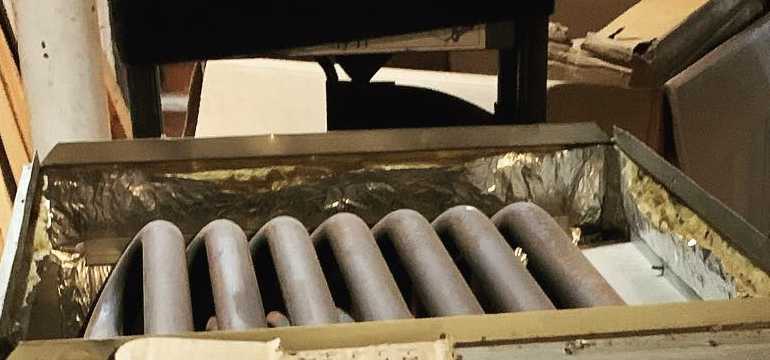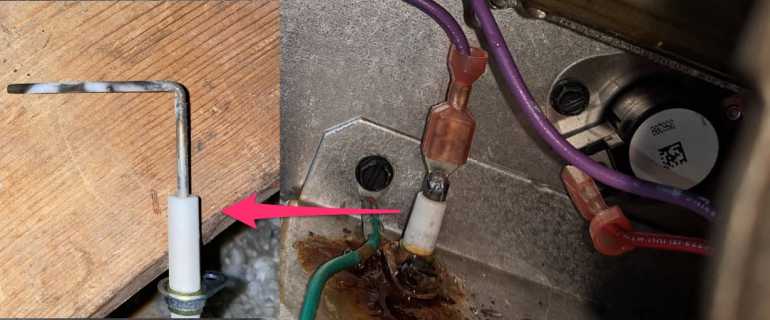You rely on your furnace to keep you and your family warm during the coldest parts of the year. But you don’t want to have to listen to constant clicking whenever you turn your furnace on.
It’s normal for clicking to occur when the furnace first comes on because it’s the sound of your ignition. But it should stop after that. If it doesn’t, you might have a serious problem.
Most furnace clicking noises while running come from either loose interior parts or continuous flipping of furnace control board switches.
For example, your furnace’s blower or inducer motor might drop to touch another part of the furnace. This can create a clicking sound.
But there’s a lot more to learn about clicking noises and your furnace. That’s why we’ve put together this article. Keep reading to get the information that you need to solve this problem.
Broken or loose parts
 There are lots of different parts that your furnace uses to function. If any of these parts get loose or broken, it could create a clicking noise. We cover the major potential culprits for this below.
There are lots of different parts that your furnace uses to function. If any of these parts get loose or broken, it could create a clicking noise. We cover the major potential culprits for this below.
Inducer or fan
Your system’s fan runs a lot. And they also come into contact with their fair share of dirt and debris.
Both of these factors can cause the fan to go out or break. And when that happens, it can produce a constant clicking sound the next time you turn your furnace on.
Additionally, many oil and gas-burning furnaces have a part called a blower. These are fans, which are powered by motors. Their purpose is to aid in the safe venting of things like smoke and other byproducts produced by your furnace.
Blowers also have a number of parts that can cause clicking. For example, bearings in the inducer blower may cause clicking. This occurs when the burner shuts down but the inducer keeps blowing.
Additionally, blowers have wheels that are housed in a frame to move the byproducts from the combustion process in the correct direction.
The wheel can sometimes get loose and that can cause it to bump into its housing. When that occurs, you may experience a constant clicking sound.
How to fix this problem
If you suspect that your inducer or fan is the source of your issues, it’s probably best to let a professional handle it. They can help you identify the specific source of the issue so you don’t have to waste time looking for it.
Motor bearings
It’s also possible that your motor bearings are the source of your problem. This could be the case if you’re getting the right amount of heat but still hear clicking.
The specific role that bearings play in your system depends on the type of system that you have. But they often exist in the air handler motor and the draft inducer motor.
These components need bearings to function properly. Because the bearings are what allow the fan blades to spin as they should. That’s true wherever the fan in your furnace is located.
When a bearing fails, it can cause a lot of noise. In addition to a clicking sound, you may also hear a grinding noise whenever the fan is running. It could even start squealing as the problem worsens.
If the bad bearing is in your draft inducer, you will probably experience the same problems. They may just not last as long. That’s because the draft inducer fan runs for only a minute or two after being turned on.
Other signs of failure
Typically, the first signs of a bearing failure come from loud noises—not a lack of heat. That’s because the friction that comes out of this makes the bearings very noisy. It should sound like a vibrating hum or grinding.
Keep in mind, the sound should only be active when the furnace is running. It may not even persist throughout the duration of each furnace cycle.
Eventually, bad bearings reduce the effectiveness of your furnace. That’s why you can also look at your airflow to diagnose this problem. If you experience reduced airflow, it could be a sign of a bearing issue as well.
What causes bad bearings?
Bearings are designed to last as long as your furnace does. So when they go bad, it’s because something in the furnace isn’t happening correctly.
For example, poor maintenance habits can cause your furnace to overheat. That can lead to the bearing grease actually “cooking” the bearings.
Over time, this diminishes their effectiveness. And if you don’t use proper lubrication, it could eventually destroy the bearings completely.
How to fix this problem
If you’ve got bearings that are worn out already, it’s time to replace them. But you can save yourself from having this issue in the future by cleaning and lubricating your system consistently.
Just make sure to take care of this problem in a timely manner. Worn-out bearings can damage your motor if not replaced in time.
Malfunction of the furnace control board
 You can think of your furnace’s control board as its brain. It’s responsible for many aspects of how your system functions, including:
You can think of your furnace’s control board as its brain. It’s responsible for many aspects of how your system functions, including:
- Ignition
- Gas valves
- Flame sensors
- Blower motor
Many new furnaces have control boards that tie into the air conditioner as well. So this board plays a really important role in making sure that your home stays as warm or as cool as you want it to.
Signs of a bad furnace control board
It’s possible that you’ve got a bad furnace control board. When that happens, various problems can arise—each of which may cause clicking.
With that in mind, here are the top signs of a bad furnace control board:
- Warning lights coming on your furnace’s diagnostic system
- Instability in temperatures throughout your home
- Unexplained interruptions in your normal furnace sequencing
What causes this problem?
Control boards can fail for lots of different reasons since they’re complex pieces of electrical equipment. Though they’re designed to be durable, they may not always last as long as your furnace.
- For example, damage from power surges can ruin the board’s transformer or burn out its fuse.
- Stuck relay switches could also be your problem. These can get stuck open or refuse to close. And that could cause various components in your system to lose their flow of electricity.
- You may also be dealing with failed transistors. These are often the first part of the control board to fail. They can get impacted by things like age, power surges, and even static electricity.
- It’s also possible that loose wiring is the source of your problem. Furnace vibrations can cause the wiring to shake loose over time. That can create an electrical short and may trip a circuit breaker in your home.
- Additionally, your control board ages over time. This can create points of failure that simply occur due to usage over an extended amount of time.
Clicking is just one of the signs that you can look at to see if you have a faulty control board. Other indicators include:
- Your furnace failing to respond to thermostat settings
- A blower that won’t stop running
If you’re noticing either of these issues in combination with clicking, it could be a sign that your control board needs replacing. A professional HVAC service technician can do that for you.
Cracked heat exchanger
 It’s also possible that you have a cracked heat exchanger, and that’s causing your clicking noise. This is more likely to be the case if the clicking is persistent—especially while your furnace runs at its hardest.
It’s also possible that you have a cracked heat exchanger, and that’s causing your clicking noise. This is more likely to be the case if the clicking is persistent—especially while your furnace runs at its hardest.
Cracked heat exchangers are really serious issues. When this happens, it can cause hazardous gas to leak into your home. So if you suspect that you have a cracked heat exchanger, you need to deal with the problem immediately.
Ducts
Your heating ducts can also cause this clicking noise problem to occur. This happens when the ducts are loose or cracked.
The key is paying attention to where the clicking sound comes from. Do you hear it far away from your furnace? If so, it could be a sign that ductwork is your issue.
For example, you might have two pieces of loose metal that click together as air passes through. Or you could have something stuck inside of a duct.
Symptoms of leaky ductwork
Leaky ductwork is a problem that you definitely want to take care of if you notice it. So here are some of the major symptoms of this issue:
- Spikes in your heating or cooling bill that are unexplained
- Parts of your home that are warmer or cooler than they should be for the season
- Rooms that are stuffy
- More dust and airborne particles in your home
- Visible damage to your ductwork
Why is my furnace making a clicking noise and giving me no heat?
A faulty ignition system
When you hear clicking noises coming from your furnace, it typically means that the ignition system is failing. For anyone unfamiliar with how a furnace works, it all starts when you set your thermostat to a warmer temperature. This causes the furnace to draw air into the burner while energy begins to build in the ignition system.
Once the energy is built up, the valve will open. The air in the burner and the gas will now mix, causing a spark that ignites the burner. When there’s an issue somewhere throughout this whole process, you’re probably going to hear a consistent clicking noise. This problem needs to be handled by a professional.
The problem may be a faulty flame sensor
 The flame sensor is also commonly known as the thermocouple. This device automatically shuts down the furnace anytime the pilot light goes out. This keeps unburned gas from rushing out, which is hazardous to your health.
The flame sensor is also commonly known as the thermocouple. This device automatically shuts down the furnace anytime the pilot light goes out. This keeps unburned gas from rushing out, which is hazardous to your health.
However, if the sensor is filthy, then the sensor might not recognize the flame. If the sensor doesn’t recognize the flame, then the furnace won’t turn on. Instead, it’ll keep continuously trying, which makes the clicking sounds.
Failure to address this problem could potentially wear out your furnace. That’s why it’s important to get the sensor cleaned as soon as you hear your furnace clicking.
Trouble with your gas supply
Another reason you may be hearing the clicking sound is because you’re having trouble with your gas supply. As mentioned above, the clicking sound is attributed to the pilot light not getting enough gas to ignite.
Trouble with your gas supply is usually attributed to a leak or a faulty valve. If you think either of these are your issues, turn off your furnace immediately and call a professional right away.
Electrical components
If you have an electrical furnace, then you don’t have to worry about a gas leak. But the inner electrical components of the furnace could still cause a clicking noise.
In either case, the best fix is to call an HVAC professional. They can help you pinpoint the precise cause of your issues.
- What to Do if Your House Smells Like Gas but There’s No Leak - February 6, 2023
- Why Is There a Burning Smell Coming From My Vents? - August 16, 2022
- How to Remove the Musty Smell From Your Air Conditioner - August 16, 2022
